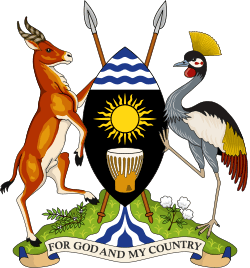Islam in Uganda
.jpg)
According to the 2002 National Census, Islam in Uganda was practiced by 12.1 percent of the population.[1] The Pew Research Center in 2014, however, estimated that 11.5 percent of Ugandans were Muslim, compared to 35.2 percent of Tanzanians, 9.7 percent of Kenyans, 6.2 percent of South Sudanese, 2.8 percent of Burundians, and 1.8 percent of Rwandans.[2] The vast majority of Muslims in Uganda are Sunni. Small Shia and Ahmadi minorities are also present.[3]
The Iganga District in the east of Uganda had the highest percentage of Muslims according to a 2009 published report.[4]
19th century
Islam had arrived in Uganda from the north and through inland networks of the East African coastal trade by the mid-nineteenth century. Some Baganda Muslims trace their family's conversion to the period in which Kabaka Mutesa I converted to Islam in the nineteenth century. Islam entered Uganda through the Buganda route in the 1840s and the northern Uganda route through the Turko- Egyptian influences. Kasozi, (1986: 23) gives 1844 as the year when the first Muslim Arab trader; Ahmed bin Ibrahim reached the King’s court in Buganda. [5]
20th century onwards
When Idi Amin, a Ugandan Muslim, became president in 1971, his presidency seemed to be a victory for Uganda's Muslim community. Then in 1972, Amin's expulsion of Asians from Uganda reduced the Muslim population significantly. As his administration deteriorated into a brutal and unsuccessful regime, Uganda's Muslims began to distance themselves from those in power.
After Amin's overthrow in 1979, Muslims became the victims of the backlash that was directed primarily against the Kakwa and Nubian ethnic groups who had supported Amin. Yusuf Lule, who served a brief term as president from 1979 to 1980, was also a Muslim (and a Muganda). He was not a skillful politician, but he was successful in reducing the public stigma attached to Islam.
In 1989, President Yoweri Museveni appealed to Uganda's Muslim community to contribute to national reconstruction, and he warned other Ugandans not to discriminate against Muslims. But at the same time, Museveni admonished Ugandans to avoid "sectarian" allegiances, and this warning was directed at the Islamic community as well as other ethnic and religious groups.
The Islamic University in Uganda is one of Uganda's institutes of Islamic teaching. It is located in Mbale in the foothills of Mount Elgon.
Persecution of non-Muslims
In June 2016, at least six Muslim villagers murdered a Christian woman in the Naigobya village of the Luuka District after she refused to apportion her land for the building of a Muslim mosque.[6] The Muslim in-laws of a Christian woman in Busandha village also in Luuka District poisoned to death her infant daughter for eating in the daytime of Ramadan.[6]
A July 2016 report said that a former imam, 53-year-old Kuluseni Iguru Tenywa of Budhagali village, Jinja District, lost his family, home, and business after his family and relatives found out he had become a Christian. He escaped after hearing their plans to end his life.[7]
2002 census
.jpg)
The 2002 national census recorded that Muslims represented 12.1 percent of the population.[1]:11
| Region | % Muslim |
|---|---|
| Central | 18.4%[8] |
| Eastern | 17.0%[8] |
| Northern | 8.5%[8] |
| Western | 4.5%[8] |
| Total | 12.1% |
See also
References
- 1 2 "2002 Uganda Population and Housing Census - Main Report" (PDF). Uganda Bureau of Statistics. Retrieved 19 January 2017.
- ↑ "Global Religious Diversity: Appendix 2, Religious Diversity Index Scores and Religious Adherents by Region and Country" (PDF). Pew Research Center. 4 April 2014. Retrieved 19 January 2017.
- ↑ "The World's Muslims: Unity and Diversity" (PDF). Pew Forum on Religious & Public life. 9 August 2012. Retrieved 14 August 2012.
- ↑ United States Department of State (26 October 2009). "Uganda". International Religious Freedom Report 2009. Retrieved 2010-06-05.
- ↑ Kasozi, A.B.K., 1994. Social Origins of Violence in Uganda, 1964-1985
- 1 2 "Christian widow murdered for refusing to give her land for mosque; Muslim woman kills infant baby fed during Ramadan", Christian Times, 4 July 2016, accessed 25 December 2016
- ↑ Muslim Imam converts to Christianity in Uganda; Resulting persecution sees him lose family, home and business. 26 July 2016. Retrieved 25 December 2016
- 1 2 3 4 "2002 Uganda Population and Housing Census - Population Composition (Household Composition, Religious and Ethnic Composition and Marriage)" (PDF). Uganda Bureau of Statistics. Retrieved 8 September 2018.


